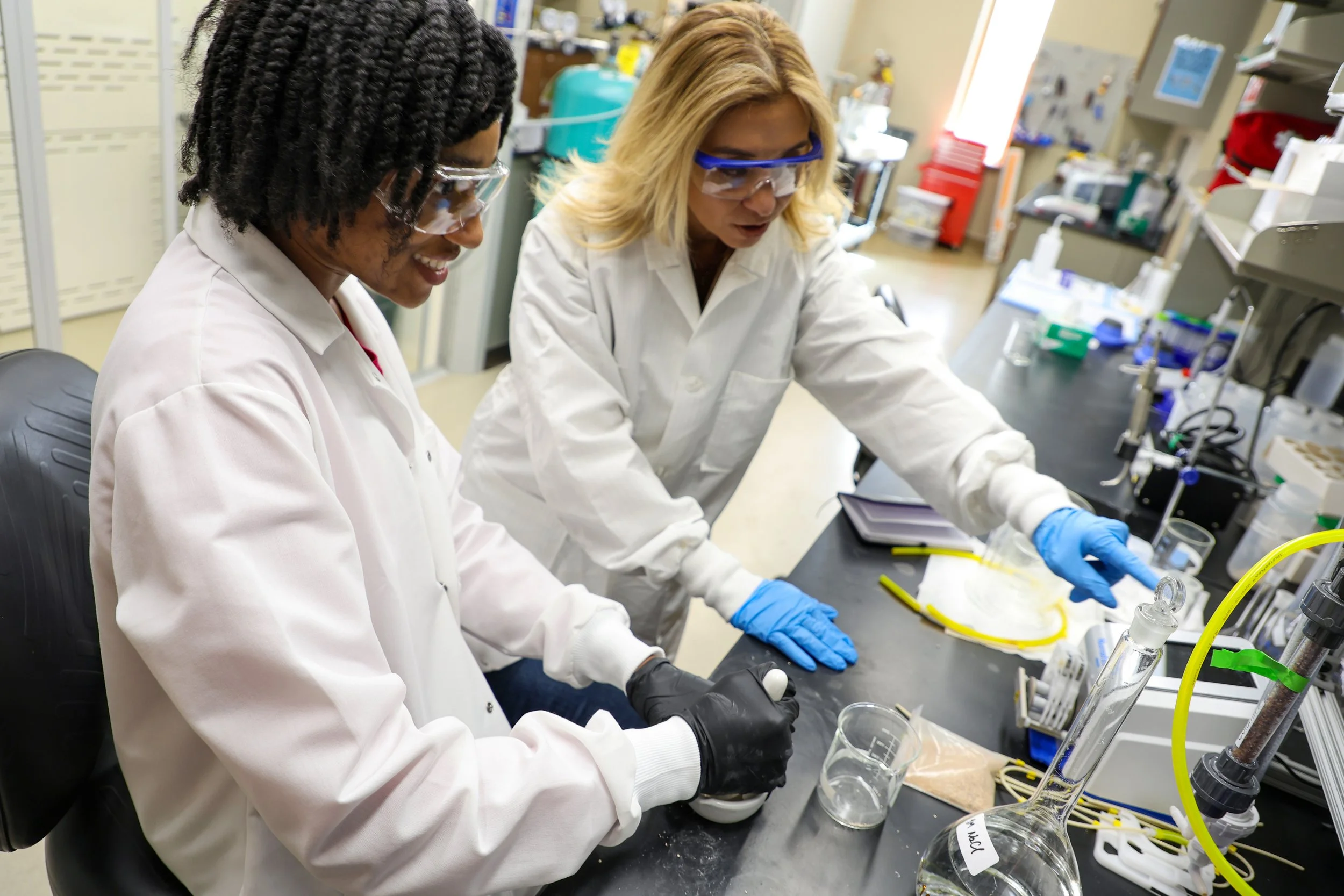
Educating the Next Generation of Engineers
Teaching Philosophy
Dr. Botte’s approach to education spans three interconnected domains: interactive classroom teaching, personalized mentoring, and community-based science outreach.
Classroom Innovation
In the classroom, Dr. Botte believes learning happens best through active engagement. Her "learn-by-doing" approach draws from the ExCEEd (Excellence in Engineering Education) model, where students encounter new concepts through hands-on experiments before diving into theoretical foundations. Her background as both a process engineer in petrochemical manufacturing and as an entrepreneur allows her to bring real-world challenges into the classroom, demonstrating how engineering principles translate to practical solutions.
Mentorship Multiplied
Dr. Botte’s mentoring philosophy centers on creating a cascade effect. While she directly mentors postdoctoral researchers, graduate and undergraduate students, she focuses on teaching them to become mentors themselves. This exponential approach has proven remarkably effective—one person might directly mentor 100 individuals in their lifetime, but when those 100 become mentors themselves, the impact grows exponentially.
Since beginning her academic career, Dr. Botte has launched six major initiatives that have reached over 2,500 K-12 students both domestically and internationally. These programs have inspired high school students, undergraduates, graduate students, postdoctoral researchers, faculty, scientists, and engineers to continue and expand this important work.
Professional Development Integration
A cornerstone of her approach is developing individualized growth plans for mentees and providing the resources they need to succeed. As the founder and director of the Engineering Research Centers and Institutes, Dr. Botte has implemented comprehensive professional development training for all personnel. Their students, scientists, and engineers receive training in:
Leadership and teamwork
Interdisciplinary collaboration
Safety protocols and procedures
Business and financial literacy
Professional ethics
Intellectual property management
Entrepreneurship fundamentals
This training includes practical skills like proposal writing, scientific publication, professional communication, presentation development, and laboratory documentation. All team members participate in weekly progress reports and technical presentations that sharpen both their research and communication abilities.
Building Sustainability in STEM
To ensure lasting impact, Dr. Botte has established three initiatives that extend beyond traditional education:
A young scientific author award in Applied Electrochemistry
Startup companies supporting research, innovation, and education
Educational media including documentaries and webinars promoting innovation in STEM
This comprehensive approach creates not just skilled engineers, but future leaders who understand how to translate scientific discovery into solutions that benefit society
Courses Taught
Dr. Botte has developed and taught 13 different courses, all of them using the “Learn-by-doing” approach. New concepts are introduced using examples or experiments, emphasizing the theory behind the concepts at the same time (EXCEED model):
Design of Engineering Experiments (sophomore level, University of Minnesota-Duluth)
Chemical Engineering Analysis (senior-graduate level, University of Minnesota-Duluth)
Chemical Engineering Design I (senior level, University of Minnesota-Duluth)
Chemical Engineering Design II (senior-graduate level, University of Minnesota-Duluth)
Engineering Research and Fundamentals (graduate level, Ohio University): this course focuses on scientific writing, basic statistics, and writing proposals.
Analysis of Electrochemical Systems (senior-graduate level course, Ohio University)
Advance Chemical Engineering Mathematics (graduate level course, Ohio University)
Chemical Engineering Calculations (junior level, Ohio University)
Problem Solving in Chemical Engineering (freshman level, Ohio University). This course focuses on computer programming for chemical engineers. Responsible for restructuring this course. The improved course covers computer programming for chemical engineers going from developing flowchart diagrams to developing successfully documented computer codes. New concepts are introduced using examples or experiments, emphasizing the theory behind it at the same time (EXCEED model).
Unit Operations Lab (senior level, Ohio University). Responsible for the development of the fuel cell experiments.
Unit Operations Lab (senior level, Ohio University. Developed a new section of the course that focuses on writing successful technical reports.
Margaret Boyd Scholars freshman and senior seminar (undergraduate level, Ohio University). The First-Year Seminar for Margaret Boyd Scholars is designed to introduce students to the variety of disciplines and approaches to women’s scholarship. The Capstone Seminar for Margaret Boyd Scholars is designed to expose students to the professional achievements of women scholars in a variety of disciplines and approaches within the university and in the wider world.



